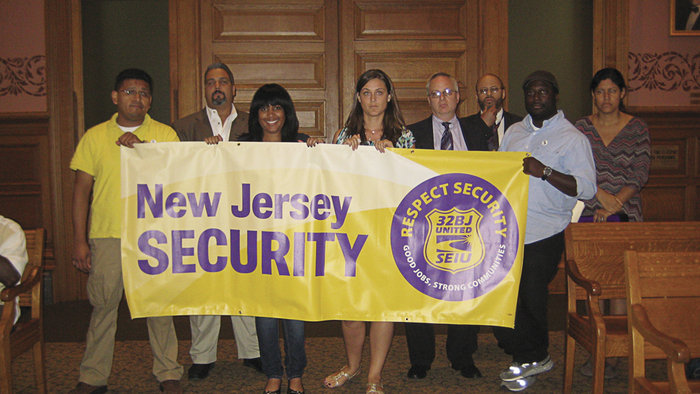Jermain Torres, a security guard who works the late afternoon/evening shift at City Hall, is responsible for protecting dozens of municipal workers at 280 Grove St. – that is in addition to protecting the thousands of residents who pass through City Hall on their way to the tax office, the Mayor’s Action Bureau, or public meetings.
Despite the nature of his work, Torres says he is barely able to makes ends meet. Earning just $7.50 an hour, he lives at home with his mother because he can’t afford his own place in Jersey City.
“It’s very hard,” Torres told the Reporter last week. “I’m struggling right now. I might have to get a second job.”
‘I’m struggling right now. I might have to get a second job.’ – Jermain Torres
Employed with U.S. Security, a private firm that has a contract with the city, Torres said he worked full-time for two years before the company finally offered its workers health care benefits.
This month the City Council will vote on a provision that would boost Torres’ hourly wage to $10.88. On June 27, the council introduced what has been described as a “living wage bill” after an earlier version of the ordinance was withdrawn in May due to concerns about how it will be enforced.
The revised law would set standard wages and benefits for security guards and janitors in buildings that receive city tax abatements or other local economic subsidies. Most of the affected employees work for private companies that have contracts with residential buildings. The law will also increase wages and benefits requirements for guards and janitors who are employed by private companies with city contracts to provide services in city buildings.
“The millions of dollars in subsidies that the city gives out should not only work for the contractors, but also the hard-working people of Jersey City,” said Councilman At-Large Rolando Lavarro Jr., who co-sponsored the ordinance with Ward E Councilman Steven Fulop. “It’s time to level the playing field. This makes sure that workers will be able to cover the bare necessities – food on the table, a roof over their head, and to take care of their health and well-being.”
If passed by the council, about 100 workers will be immediately affected. While security guards and janitors are mainly the ones affected by the proposal, a handful of clerical and food service workers would also benefit.
Council still divided
The ordinance specifically requires that security guards and janitors in buildings that have received $1 million or more in tax abatements or other subsidies get paid the same wages as their unionized counterparts elsewhere in Hudson County. If no such union agreement exists in the county, the workers must be paid at least 150 percent of federal minimum wage, or $10.88 an hour.
For example, under the bill, janitors would get an increase in pay from $10.50 an hour to $14.15 an hour. This is the hourly wage Hudson County companies pay janitors who are covered by Local 32BJ of the Service Employees International Union (SEIU).
Security guards who work at city buildings, like Torres, would get a boost in pay to $10.88 per hour since Hudson County does not have any unions that cover security personnel.
The council formally introduced the Fulop-Lavarro ordinance by a vote of 7-2. Council members David Donnelly, Peter Brennan, Michele Massey, Nidia Lopez, Viola Richardson, Fulop, and Lavarro voted to introduce the measure. Ward A Councilman Michael Sottolano and Ward D Councilman William Gaughan voted against it.
“This ensures that subsidized development benefits the people who live in Jersey City,” said Kevin Brown, New Jersey State Director for Local 32BJ, which helped Lavarro and Fulop draft the ordinance.
In May, the ordinance was withdrawn after Sottolano and other members of the council questioned whether it could be effectively enforced.
Despite revisions made since Fulop and Lavarro first proposed the ordinance in May, Sottolano still voted against the introduction of the ordinance.
“I don’t think it’s the job of the city to negotiate fair wages at private companies,” said Sottolano. “That’s the job of the unions.”
Richardson: ‘Phone ringing off the hook’
But Richardson, who had also expressed some concerns with the wording of the first draft of the ordinance, said her “phone has been ringing off the hook” with residents who expressed support for the measure.
Dozens of security officers and janitors attended the May 9 council meeting and testified in support of the ordinance as well.
“Once I get through paying rent, and take out money for my transportation, and pay my cell phone bill, that’s it. I can’t afford to buy groceries,” Mark Reeves told the Reporter in May. Reeves works as a security guard at a residential building that received a tax abatement from the city.
“Currently, in publicly subsidized buildings, unless there is a union contract, the only wage floor is the federal minimum wage of $7.25 an hour,” Margarita Alonzo, a building service worker, told the council last week. “A…worker paid minimum wage would earn $15,080 annually full-time. At that level, a household of two [people] would qualify for public benefits, including food stamps and NJ Family Care.”
The City Council will hold a hearing and vote on this ordinance on Wednesday, July 18 during a special 10 a.m. public meeting.
E-mail E. Assata Wright at awright@hudsonreporter.com.
